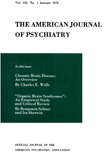A PRELIMINARY REPORT ON THE USE OF D-DESOXYEPHEDRINE HYDROCHLORIDE IN THE STUDY OF PSYCHOPATHOLOGY AND PSYCHOTHERAPY
Abstract
1. D-desoxyephedrine hydrochloride was employed intravenously in an intensive study of 22 patients with psychoneurotic illness.
2. It was found invaluable as a working tool for—
(a) the delineation of defenses available to the patient, and the role of this delineation in diagnosis and research.
(b) a nosological differentiation in so-called "border-line" syndromes.
(c) the vivid clarification of transference reactions.
(d) the unexpected confrontation of the alert patient with a dramatic change in his chronic symptoms, and its consequent impetus toward recovery.
(e) the marked reduction in time consumed in obtaining valuable conscious and preconscious material.
3. A repeated phenomenon, which we have labeled "reawakening of focal memory," has been frequently observed, and represents a challenge to the study of recall, and psychic representation.
4. It allows for clearly observable phenomena even in the presence of a group, and thus affords an excellent medium for teaching purposes.
Access content
To read the fulltext, please use one of the options below to sign in or purchase access.- Personal login
- Institutional Login
- Sign in via OpenAthens
- Register for access
-
Please login/register if you wish to pair your device and check access availability.
Not a subscriber?
PsychiatryOnline subscription options offer access to the DSM-5 library, books, journals, CME, and patient resources. This all-in-one virtual library provides psychiatrists and mental health professionals with key resources for diagnosis, treatment, research, and professional development.
Need more help? PsychiatryOnline Customer Service may be reached by emailing [email protected] or by calling 800-368-5777 (in the U.S.) or 703-907-7322 (outside the U.S.).



